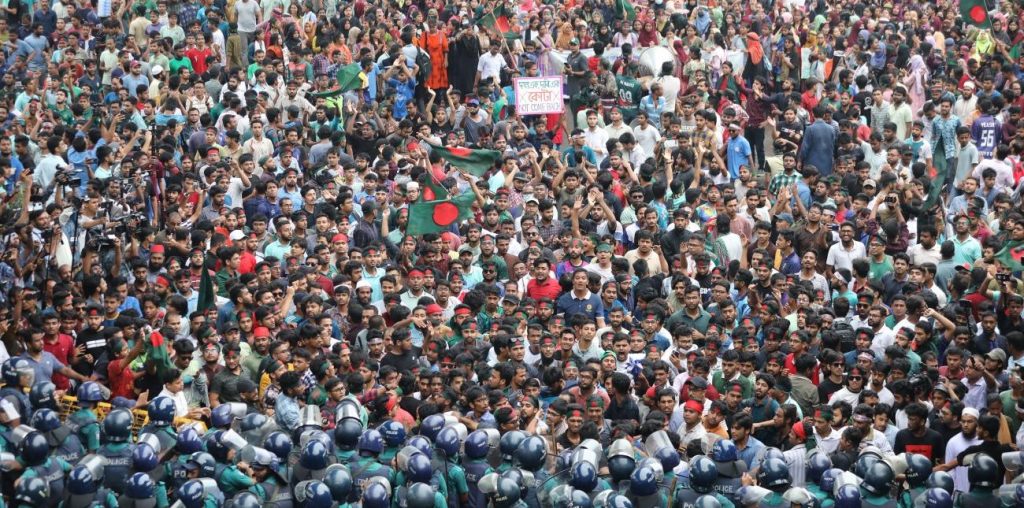The July Uprising ignited a firestorm of protest in Bangladesh, challenging the government’s quota system. Learn about the events, the impact, and the legacy of this pivotal moment in Bangladeshi history.

A Spark Ignites a Revolution
The summer of 2024 witnessed a pivotal moment in Bangladesh’s political landscape, forever etched in the nation’s memory. What began as a student-led protest against a quota system for government jobs rapidly transformed into a nationwide July uprising, challenging the very core of the ruling regime. This essay explores the genesis, development, impact, and lasting legacy of this defining event in Bangladesh’s history.
The Genesis of the Uprising
At the heart of the conflict lay the Supreme Court’s decision to reinstate a quota system that reserved 30% of government jobs for the descendants of freedom fighters who had valiantly fought for Bangladesh’s independence in 1971. While honoring the sacrifices of these heroes was undoubtedly a noble gesture, a significant portion of the population, particularly the youth, viewed the quota as an unjust barrier to meritocracy.
Students, the lifeblood of any nation, were among the most vocal critics of this system. They argued that such a policy undermined the principles of fairness and equality, hindering the progress of talented individuals who were not fortunate enough to be born into privileged families. Fueled by a sense of injustice and a desire for a level playing field, students began to organize protests on university campuses across the country.
A Movement Takes Shape: The July Uprising Spreads
Initially confined to university campuses, the protests quickly gained momentum as the July uprising spread throughout the nation. The government’s heavy-handed response, characterized by excessive force and numerous casualties among protestors, fueled public outrage. Citizens from all walks of life, including professionals, activists, and ordinary people, joined the movement in solidarity. The July Uprising transcended student activism, becoming a national movement for social justice and equality.
The Government’s Brutal Response to the July Uprising
In a desperate attempt to quell the July Uprising, the government resorted to increasingly harsh measures. Law enforcement agencies used tear gas, water cannons, and even live ammunition to disperse protestors. The number of casualties rose dramatically, with many protestors suffering serious injuries or even death. Furthermore, the government imposed a communication blackout, shutting down the internet and restricting access to social media platforms. This strategy aimed to stifle dissent and prevent the July Uprising from gaining further traction.
A Nation United: The Power of the People in the July Uprising
Despite the government’s brutal tactics, the spirit of the July Uprising remained unbroken. The protestors displayed remarkable resilience and unwavering determination in the face of adversity. The movement became a testament to the power of youth and the collective will of the people. It served as a stark reminder that even in the darkest of times, the human yearning for freedom and justice can prevail. The July Uprising forced the government to acknowledge the public’s demands for a fairer and more just system.
The Legacy of the July Uprising: A More Democratic Bangladesh
The July Uprising left an enduring legacy in Bangladesh. It demonstrated to the world the transformative power of peaceful protest and the critical role of citizen participation in shaping a nation’s future. The movement served as a catalyst for political change, paving the way for a more democratic and just Bangladesh. It inspired a new generation of activists who continue to strive for social progress and equality.
Remembering the Sacrifices of the July Uprising
As we reflect on the events of July 2024, it is crucial to remember the sacrifices made by those who participated in the July Uprising. Their unwavering courage and unwavering commitment to a better future will continue to inspire generations to come. Their legacy serves as a constant reminder of the power of the people and their ability to effect positive change in the face of oppression.
Further Resources on the July Uprising
- Wikipedia: 2024 Bangladesh quota reform movement: https://en.wikipedia.org/wiki/2024_Bangladesh_quota_reform_movement
- Foreign Policy: Bangladesh: Media, Journalism, Protests, Sheikh Hasina: https://foreignpolicy.com/2024/08/12/bangladesh-media-journalism-protests-sheikh-hasina/
